Poland: at an Inflexion Point
October 21, 2023 | Expert Insights

The recent parliamentary election could change the face of Polish foreign policy with a decisive victory for the opposition led by Mr Donald Tusk. These political transformations have implications for the EU, which was closely monitoring the elections. With relations between Poland and Ukraine heading South due to cheap wheat imports into Poland, it was time for some delicate diplomacy.
Background
Mr Donald Tusk's opposition secured a clear majority in the Sejm, Poland's lower house of parliament, marking a pivotal moment in the nation's political landscape. The defeat of the Law and Justice party, in power since 2015, has been criticized for a perceived illiberal drift. Its electoral departure raises hope for a more democratic and pluralistic Poland under Tusk's leadership.
One of the central promises made by Mr Tusk is the ‘restoration’ of Poland's relationship with the European Union. Over recent years, Poland has been a contentious partner within the EU, clashing with Brussels over issues like the rule of law and migration, blaming Brussels for permitting a flood of refugees into Europe. Mr Tusk's victory is expected to usher in a more constructive rapport between Poland and the EU, with his strong pro-EU stance and a willingness to collaborate with other European leaders to strengthen the bloc.

Analysis
Poland's historical Euroscepticism has been a notable factor in its EU relations. A 2023 Pew Research Centre survey revealed that only 54 per cent of Poles view the EU favourably, in contrast to the 69 per cent average across Europe. Under the Law and Justice party's rule, Poland's connection with the EU had notably soured. Tensions emerged over fundamental issues like the rule of law, migration, and climate change, leading to the EU's triggering of the Article 7 procedure against Poland in 2021, citing violations of the bloc's core values.
Mr Donald Tusk, in contrast, boasts a strong pro-EU track record. His prior roles as Prime Minister of Poland (2007-2014) and President of the European Council (2014-2019) showcase his commitment to European integration. Notably, during his tenure as Prime Minister, Poland joined the Schengen Area and made strides toward eurozone accession.
Mr Tusk's electoral promise to restore Poland's relationship with the EU is pivotal. In an interview with the Financial Times, Tusk affirmed his commitment to "rebuild cooperation with the EU" and his dedication to the European project. Given this, it is reasonable to anticipate an improved rapport between Poland and the EU, fostering a more constructive partnership. Such a development would yield benefits for both sides. For Poland, a rejuvenated connection with the EU would translate into access to vital EU funding and markets and strengthened support from its European allies. This could significantly aid Poland's economic and political stability.
Conversely, the EU stands to gain from a more united front in confronting common challenges, such as the ongoing war in Ukraine and Gaza and the pressing energy crisis. A Poland that reengages positively with the EU would contribute to a more cohesive European Union, where member states collaborate effectively on shared priorities.
However, it's crucial to temper expectations. Tusk's victory, while promising, does not guarantee a seamless relationship between Poland and the EU. Lingering contentious matters like the rule of law and migration remain to be resolved.
Despite the electoral victory, it is essential to acknowledge that the Law and Justice party, led by Jaroslaw Kaczynski, has not conceded defeat. Kaczynski accused the opposition of fraud and threatened legal challenges to the election results, raising the spectre of political instability. This could have adverse consequences, particularly for Poland's support of Ukraine in its ongoing conflict with Russia.
Poland has long been one of Ukraine's most steadfast supporters. Tusk's victory is expected to lead to even more substantial support for Ukraine. Tusk has pledged to increase military aid to Ukraine, and his commitment to strengthening the EU's eastern flank could involve boosting NATO presence in the region and providing Ukraine with increased economic and military assistance. These measures would bolster Ukraine's ability to defend itself against external threats.
Tusk also aims to forge closer economic ties with Ukraine, fostering increased trade and investment between the two nations. The existing strong economic relationship between Poland and Ukraine, which accounted for over $10 billion in trade in 2022, is likely to grow even stronger under Tusk's leadership. This growth will create jobs and enhance economic prosperity in both countries.
In the diplomatic arena, Tusk's international standing and relationships with world leaders position him as a powerful advocate for Ukraine on the global stage. He plans to leverage his influence to persuade other nations to provide more significant military and financial support to Ukraine, a move that can help Ukraine in its ongoing struggle at a time the attention is being distracted towards the Middle East.
While the 2023 Polish parliamentary elections have undoubtedly marked a positive development, Donald Tusk faces an array of challenges in the years ahead. Poland's economy is grappling with inflation and rising energy prices, posing hurdles to its growth. Additionally, the country faces social and political divisions internally that need attention and resolution.
Assessment
- Tusk's victory is likely to lead to increased military, diplomatic, and economic support for Ukraine from Poland. It is also likely to lead to a more constructive relationship between Poland and the EU. Kyiv would be the happiest recipient of this news.
- However, a word of caution: the Law and Justice party is far from a spent force. If it successfully aggravates the growing frustration within Poland against the Ukraine war, it could lead to a period of political instability in Poland. This would be bad news for Ukraine and NATO, which need Polish support for the war.
- It is also worth noting that Tusk's victory does not guarantee that Poland will become a more pro-European country. Tusk himself has been critical of the EU in the past. It is possible that Tusk's government will continue to clash with the EU on certain issues.








Comments